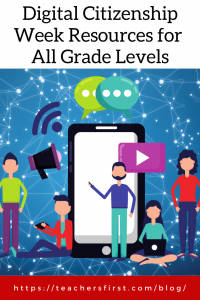A digital citizen is “a person who develops the skills and knowledge to effectively use the internet and other digital technology, especially to participate responsibly in social and civic activities.”
Dictionary.com
Digital Citizenship Week is celebrated annually during the third week of October and encourages reflection upon the use and interactions with technology. October is an excellent time to think about digital citizenship in your classroom. You have probably already established your classroom community; now, it is time to develop and learn about the digital community beyond your classroom.
There are many resources available for teaching digital citizenship for all grade levels. Let’s take a look at a few of them and how to use them within your classrooms.
Book Creator (reviewed here) offers three books for elementary students created in collaboration with Common Sense Education. These books provide interactive activities that help students recognize and participate in responsible online activities.
- Share each book to Google Classrooms for students to view or add to your Book Creator class library to share using the URL or embed code for blogs.
- Did you know that you can remix books? Click the remix button to add the text to your library and edit. For example, add student videos ar audio recordings that respond to prompts, add pages with student digital citizenship projects, or add links to games and learning activities.
- Start from scratch to create a class book for students to access all year long. Then, add pages throughout the school year as students gain understanding and skills on their journey toward responsible digital citizenship. Students will enjoy visiting their books over and over because they create the content.
Common Sense Media (reviewed here) offers a curriculum and activities that teach digital citizenship for all grade levels. Digital Compass is an animated activity that appeals to middle school students. Choose one of the eight characters that guide players through various scenarios to learn about cyberbullying and Internet safety. The accompanying Teacher’s Guide provides curricular information and recommendations for additional lessons.
- Share the Digital Compass activity with students as an introduction to digital citizenship lessons.
- After students have time to participate, ask them to relate the activities to their online experiences, such as recognizing reliable online resources or understanding the creation of digital footprints.
- Have students share tips for becoming responsible digital citizens by creating videos, infographics, or flyers using Adobe Spark for Education (reviewed here). Then, share your students’ creations on your class website or with elementary classrooms to help them understand the importance of digital citizenship.
The Digital Civics Toolkit (reviewed here) guides high school students through a series of modules teaching about the civic potentials of digital life. The content helps students understand how to participate, analyze, and use their digital voice.
- Modules include conversation starters related to a linked commentary or video. Use the links to find Teacher Background Resources for each module. The educator resources include suggested platforms for student use and additional readings that support the module’s topic.
- As students develop an understanding of the bigger purpose of digital citizenship – the ability to participate responsibly in social and civic activities, consider having them create podcasts that emphasize digital skills. Buzzsprout (reviewed here) offers free podcast hosting. Ask groups of students to create an ongoing podcast series sharing tips and advice for peers.
- Another option for sharing student learning is conducting workshops for younger students or sharing advice on navigating online information within the community. Topics might include finding reliable online news resources, understanding how to separate real news from disinformation, or tools for conducting safe internet searches.
Of course, teaching digital citizenship is a year-round activity. Digital Citizenship Week serves as an annual reminder to focus on digital skills and responsible actions in our classrooms. Do you have suggestions for lessons or activities that support responsible digital citizenship? Please share them in the comments below.


